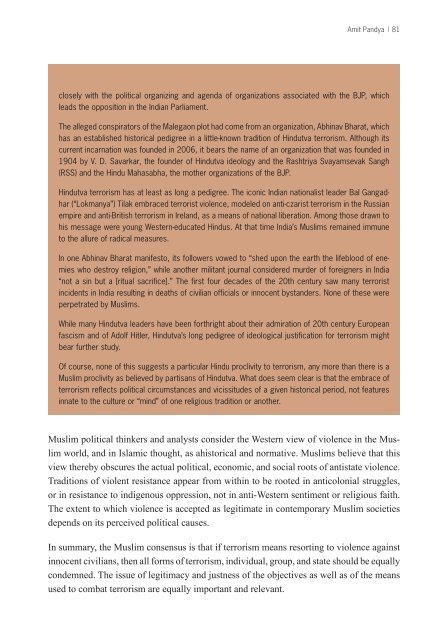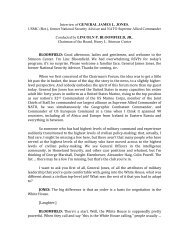Islam and Politics - The Stimson Center
Islam and Politics - The Stimson Center
Islam and Politics - The Stimson Center
Create successful ePaper yourself
Turn your PDF publications into a flip-book with our unique Google optimized e-Paper software.
Amit P<strong>and</strong>ya | 81<br />
closely with the political organizing <strong>and</strong> agenda of organizations associated with the BJP, which<br />
leads the opposition in the Indian Parliament.<br />
<strong>The</strong> alleged conspirators of the Malegaon plot had come from an organization, Abhinav Bharat, which<br />
has an established historical pedigree in a little-known tradition of Hindutva terrorism. Although its<br />
current incarnation was founded in 2006, it bears the name of an organization that was founded in<br />
1904 by V. D. Savarkar, the founder of Hindutva ideology <strong>and</strong> the Rashtriya Svayamsevak Sangh<br />
(RSS) <strong>and</strong> the Hindu Mahasabha, the mother organizations of the BJP.<br />
Hindutva terrorism has at least as long a pedigree. <strong>The</strong> iconic Indian nationalist leader Bal Gangadhar<br />
(“Lokmanya”) Tilak embraced terrorist violence, modeled on anti-czarist terrorism in the Russian<br />
empire <strong>and</strong> anti-British terrorism in Irel<strong>and</strong>, as a means of national liberation. Among those drawn to<br />
his message were young Western-educated Hindus. At that time India’s Muslims remained immune<br />
to the allure of radical measures.<br />
In one Abhinav Bharat manifesto, its followers vowed to “shed upon the earth the lifeblood of enemies<br />
who destroy religion,” while another militant journal considered murder of foreigners in India<br />
“not a sin but a [ritual sacrifice].” <strong>The</strong> first four decades of the 20th century saw many terrorist<br />
incidents in India resulting in deaths of civilian officials or innocent byst<strong>and</strong>ers. None of these were<br />
perpetrated by Muslims.<br />
While many Hindutva leaders have been forthright about their admiration of 20th century European<br />
fascism <strong>and</strong> of Adolf Hitler, Hindutva’s long pedigree of ideological justification for terrorism might<br />
bear further study.<br />
Of course, none of this suggests a particular Hindu proclivity to terrorism, any more than there is a<br />
Muslim proclivity as believed by partisans of Hindutva. What does seem clear is that the embrace of<br />
terrorism reflects political circumstances <strong>and</strong> vicissitudes of a given historical period, not features<br />
innate to the culture or “mind” of one religious tradition or another.<br />
Muslim political thinkers <strong>and</strong> analysts consider the Western view of violence in the Muslim<br />
world, <strong>and</strong> in <strong>Islam</strong>ic thought, as ahistorical <strong>and</strong> normative. Muslims believe that this<br />
view thereby obscures the actual political, economic, <strong>and</strong> social roots of antistate violence.<br />
Traditions of violent resistance appear from within to be rooted in anticolonial struggles,<br />
or in resistance to indigenous oppression, not in anti-Western sentiment or religious faith.<br />
<strong>The</strong> extent to which violence is accepted as legitimate in contemporary Muslim societies<br />
depends on its perceived political causes.<br />
In summary, the Muslim consensus is that if terrorism means resorting to violence against<br />
innocent civilians, then all forms of terrorism, individual, group, <strong>and</strong> state should be equally<br />
condemned. <strong>The</strong> issue of legitimacy <strong>and</strong> justness of the objectives as well as of the means<br />
used to combat terrorism are equally important <strong>and</strong> relevant.

















